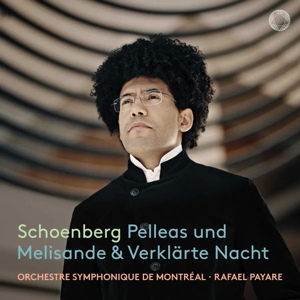
Arnold Schoenberg (1874-1951)
Pelleas und Melisande, Op 5 (1902-1903)
Verklärte Nacht, Op 4 (first string orchestra version; revision 1943)
Orchestre symphonique de Montréal/Rafael Payare
rec. 2024, La Maison symphonique de Montréal, Canada
Pentatone PTC5187218 [73]
I am very attached to Verklärte Nacht, the shorter of the two works here, and produced a survey of the major recordings in 2021. I have since endorsed a recording on the album Through the Night by the United Strings of Europe (review), and am always ready to audition a new version. I am much less familiar with the symphonic poem Pelleas und Melisande, evidence of the hold which Maeterlinck’s Symbolist play exercised over composers around the turn of the 19C into the 20C, but my go-to recording has been Karajan with the BPO in 1974.
This new release sounds every bit as voluptuously played and the digital sound is markedly superior, with individual instrumental strands more distinctly defined and greater depth. The surging climax to the violent second track (1b, Principal Theme) is just as telling and the whole score is suffused with a languorous eroticism alternating with explosive outbursts; the Love Scene which ends with Golaud killing Pelleas (iii b, track 7) and the ensuing Reprise (track 8) are taut with a mounting, ambivalent suspense hovering between the passionate and the violent. The eerie, descending flute figures, played against a brass chorale, depicting Melisande’s death chamber, are especially atmospheric here, then in the Epilogue, Payare manages to re-build a sense of tragic grandeur, with brass snarling over grumbling lower strings.
To my ears, the opening to Verklärte Nacht is decidedly more “Bewegt” than its marking, “Grave”, but that is characteristic of the way the piece as a whole is delivered here, its timing of 29 minutes indicating that this is one of the more propulsive performances. The sonority of the orchestra and engineered sound, however, mostly offset any sense of undue spareness, even if my own taste veers towards something a little more upholstered. The drama of the scenario is particularly emphasised but that does not prevent Payare really pulling back for the “Molto rallentando” second section to revel in its sensuousness. The “forgiveness” movement is tenderly played and concertmaster Andrew Wan’s solo is truly and sweetly intoned. When we come to the climax of redemption and transfiguration in the penultimate track it is clear how carefully Payare has gauged the gradual accumulation of tension and the coda is exquisitely delicate: the aural equivalent of sparkling flakes of starlight – just beautiful.
Ralph Moore
Buying this recording via a link below generates revenue for MWI, which helps the site remain free.



















